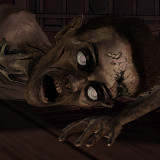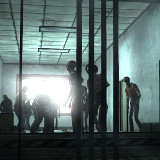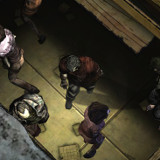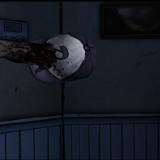The Walking Dead
People will often go mad when they believe their life is over.
Telltale Games is a so-called "indie" company formed about six years after the beginning of the downfall of adventure games, which we've already discussed, and about four years after the end of the same thing, which we haven't (yet)1. Perhaps coincidentally, or perhaps not, many of the guys who founded Telltale were former employees of LucasArts, which, y'know, says stuff. I prefer seeing them as people who went to set this whole computer adventure game stuff right, and so they did when they bought the rights to make Sam & Max games, and then Monkey Island games, and so on and so forth; and at some point they decided they want to make their own story, but that time hasn't arrived yet as far as I know, because this one's based on a comic book.
Now, if you haven't played the first season yet, then I'm really going to break this for you, so don't read if you're the kind who gets touchy about spoilers2. It's today, I guess, and Lee Everett (controlled by the player) is in a police car, ready to be convicted of murder, or has been, or something along those lines; doesn't matter, because the world ends now. Yep, just like that.
And not only it ends, but it ends through the most clichéistic turn of events ever: dead people start walking the streets and eating living people to death, turning them into more dead people walking the streets and eating... well, you get the idea. So Lee doesn't die just yet, otherwise this wouldn't be much of a game. Instead, he finds Clementine -- the main character of the series, just so we're clear about this -- and they head on somewhere, trying to survive; somewhere in Georgia, on the way to Macon and then hell-on-Earth knows where.
 This is the basic story, which the writers, directors and whatnot decided to structure into some kind of sitcom3 made up of „chapters”, „episodes” and „seasons”. So far Seasons One and Two are available, but I've decided to cover only the first one, although I might make this into a series if things get interesting along the way.
This is the basic story, which the writers, directors and whatnot decided to structure into some kind of sitcom3 made up of „chapters”, „episodes” and „seasons”. So far Seasons One and Two are available, but I've decided to cover only the first one, although I might make this into a series if things get interesting along the way.
Anyway, this whole structure leads me to see the crux of the game as "stuff happens": various characters come and then go, mostly by getting eaten or shot or what happens in the somehow believable universe of The Walking Dead. This, of course, makes nitpickers such as myself want to dig deeper for a meaning, or understanding where all the unholy flesh-eating disorder comes from. Unfortunately not even a clue is given by the end of the first season, which is quite believable given this rather peculiar universe, where actual food is a rare commodity, let alone stuff such as electricity. What I particularly liked about it is that this didn't make it horror or anything, only downright disturbing.
 The story of the first season is, however, or at least I believe it is one of maintaining an ounce of sanity in the midst of chaos. At the end of the day it's Lee trying to educate a girl he becomes attached to pretty early on, while surviving along with a bunch of other people and making the tough decisions, but the normal decisions regarding the circumstances.
The story of the first season is, however, or at least I believe it is one of maintaining an ounce of sanity in the midst of chaos. At the end of the day it's Lee trying to educate a girl he becomes attached to pretty early on, while surviving along with a bunch of other people and making the tough decisions, but the normal decisions regarding the circumstances.
The game implements a decision tree spanning I think from the first episode of the season to the last (and, from what the developers say, into the following seasons), where the player is faced with choosing between some evil or another, between saying something stupid or something stupider and so on. The weird part is that a large part of the dialogue choices are timed, which gives you the option to shut up, which I find to be a breath of fresh air, despite the possible frustration it might cause. These mechanics extend to other actions, such as deciding between what object you'll toss down the head of a "walker" next or trying desperately to avoid a fight with someone whose help you might need later. My feelings regarding this whole thing range from "wow, cool, take that bullet, put it into the shotgun, just like in real life! then shoot the goddamned zombie" to "fuck, I can't find the focus point for this object, welp, now I'm dead, gotta restart". In some ways that's just like in real life, but in others, spending too much time trying to select an object that's right in front of you can be frustrating.
 Overall, the game's mechanics tend to orient it towards an "interactive drama", less focused on combining this object with that and fitting it with the rubber ducky, and more on dialogue, even though The Walking Dead is no Gabriel Knight4. Myself, I would have preferred the feeling of a good book instead of that of a good TV show, but I get it, Telltale are really good at making this kind of stuff.
Overall, the game's mechanics tend to orient it towards an "interactive drama", less focused on combining this object with that and fitting it with the rubber ducky, and more on dialogue, even though The Walking Dead is no Gabriel Knight4. Myself, I would have preferred the feeling of a good book instead of that of a good TV show, but I get it, Telltale are really good at making this kind of stuff.
As hinted before, I've only played Season One so far. I don't know where this is going: the authors seem to want to stick it to a five-parter, which means that the story is supposed to have a well thought out beginning and an end right at this moment. The feeling I've been given so far, and I hope I'm wrong, is that this has the potential of going in the direction of Lost or some other TV series I haven't seen5, ending stuck in a rut, or maybe worse. Well, I never thought I'd say this, but the whole zombie apocalypse thing has great potential to be exploited in exactly the right way. And I'm looking forward to playing, and hopefully enjoying, the whole thing.
Post Scriptum: I get that the American public is sensitized to the emotionally wrecking thing, but it hasn't quite gotten to me. The final scene almost got a tear out of me, but I still made the right decision, which was to tell Clementine to blow Lee's brains out. Hey, sorry, that's one fucked up world, it'd be stupid to judge it by any "normal" standards.


I promise I'll write about the beginning of the 2000s, when some of the best (and last) adventure games ever spurted out of the middle of Nor... I mean, nowhere. I am looking forward to it, oh, with so many deep feelings and so much nostalgia.↩
That's because I like to think that I prefer writing analyses and not reviews. I've tried to shed my thoughts on some good games without a good story, but I eventually found out it wasn't worth it. So, there you go.↩
Actually, a walkdram?↩
Gabriel Knight is more of an "interactive narrative" if you ask me.↩
Actually, there are a few I've seen: Star Trek and spin-offs? Stargate SG-1 and spin-offs? The Simpsons? Maybe Twin Peaks, but this one was really great and ruined by whoever decided to mess up Lynch's brilliant idea. Oh, which reminds me: Seinfeld, but that was a show about nothing in the first place.↩